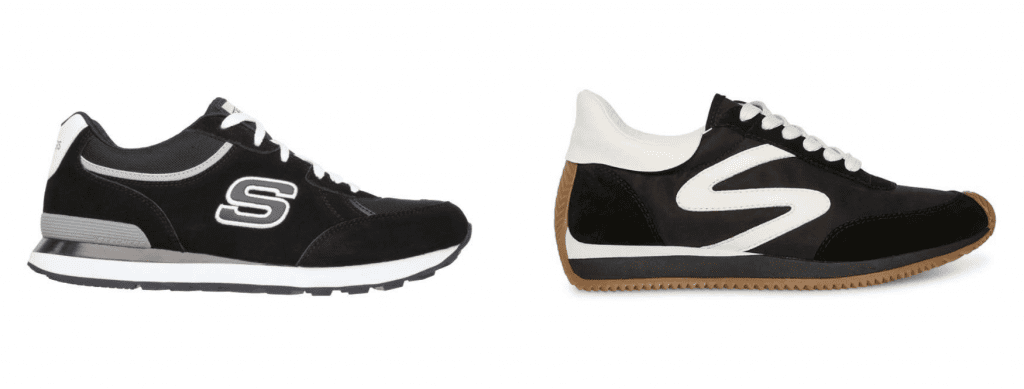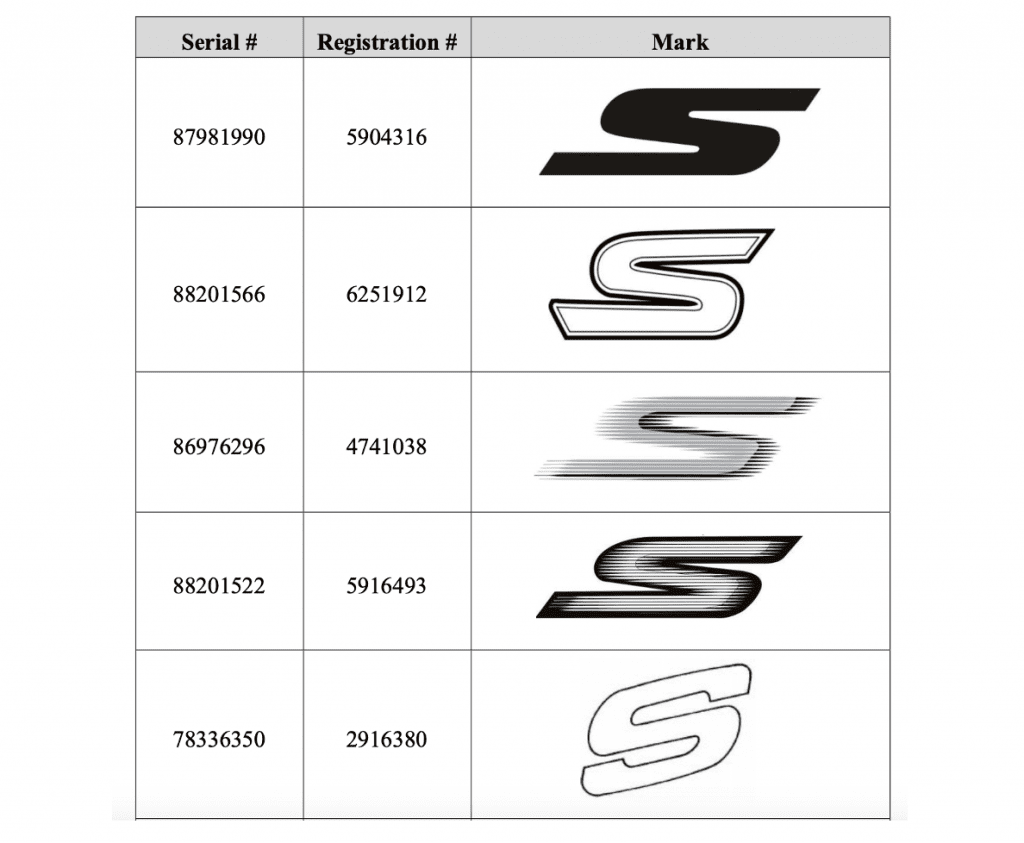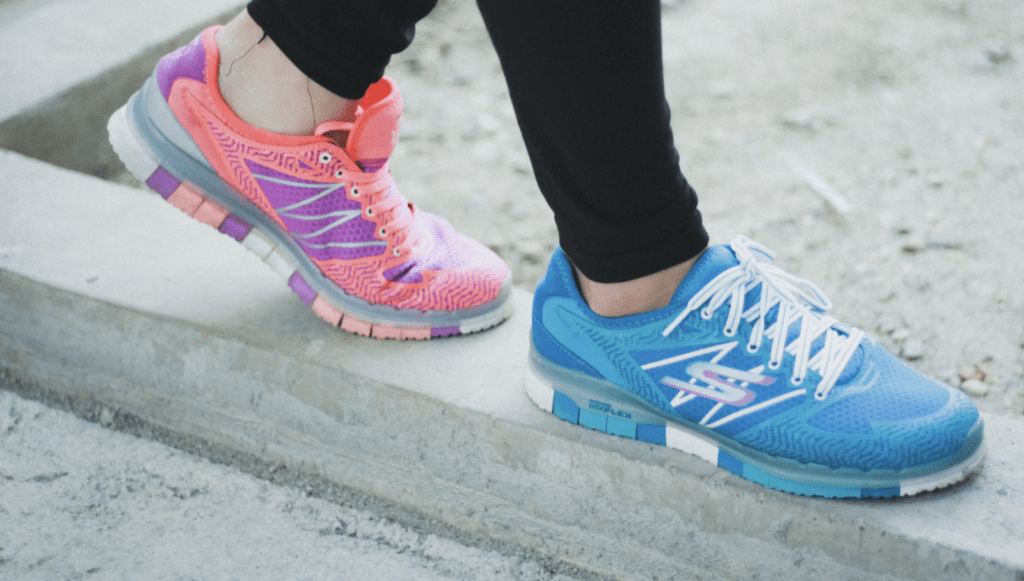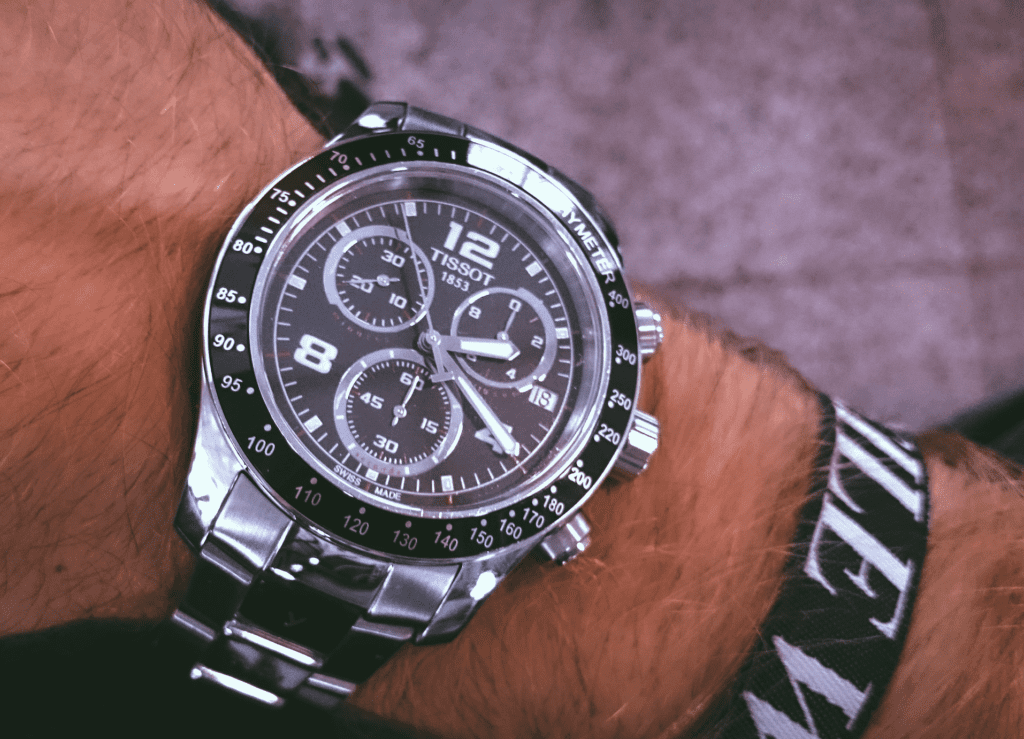On the heels of settling a trademark case waged against it by Brooks, Skechers is in the midst of a brand new trademark lawsuit – one that it has lodged against Steve Madden. According to the complaint that it filed with the U.S. District Court for the Central District of California on Tuesday, Skechers claims that fellow footwear maker Steve Madden is on the hook for infringing its well-known “S” logo to sell competing sneakers and likely, confusing consumers – and diluting the distinctiveness of Skechers’ “S” marks – in the process.
In the newly-filed complaint, Skechers claims that “despite Madden’s awareness of Skechers’ well-known marks,” New York-based Madden is currently using a “confusingly similar mark” on its “Kennie” sneaker. The logo used on the allegedly infringing Madden shoe is “substantially similar” to Skechers’ “S” marks, the company contends, as it is “essentially a stylized ‘S’ of similar (if not nearly identical) proportions and thicknesses to multiple logos used by Skechers that has been rotated slightly counterclockwise.” Moreover, Skechers asserts that the Madden logo is “placed in the same location where Skechers typically places its marks” – namely, on the side of the shoe (which is a common placement for footwear logos, just ask New Balance or adidas or Nike or Vejas, etc.).
Further making its infringement argument, Skechers states that Madden is using the allegedly infringing logo on “similar products marketed to the same consumers in the same channels, making it highly likely that consumers will be confused as to whether Skechers is responsible for, distributes, has authorized or licensed, or is otherwise involved with the shoes that Madden is selling.”

And still yet, even if consumers are not confused, Skechers argues that “Madden’s unauthorized use of a mark that is substantially similar to those of Skechers dilutes the distinctiveness of Skechers’ famous ‘S’ marks, in violation of both federal and state law.” (I, for one, am curious to see if the court finds that any – let alone all – of Skechers’ “S” marks are famous enough to merit a dilution claim. I am also curious to see if New Balance is tempted to take action over the Skechers sneaker above.)
Trademark Family – Interestingly, in furtherance of its trademark infringement and dilution, unfair competition, and unfair and deceptive trade practices claims, Skechers points to trademark registrations for almost two dozen different “S” logos, which it claims that it has used with “such regularity and consistency over time that consumers in the United States have come to widely recognize not only individual registered and unregistered marks with Skechers, but also to associate solely with Skechers the use of a prominent, stylized ‘S’ on a footwear product that has sizing, proportions and placement similar to those of the ‘S’ marks.”
In fact, Skechers contends that “the public, including the media, immediately recognizes and associates the individual ‘S’ marks, as well as the family marks of which they are part, with Skechers.” Delving into its “trademark family” assertion, which is, in my opinion the most interesting element of the complaint, Skechers claims that it has made “long and pervasive use” of the “S” marks both “individually and as a family of marks to identify its products.”

For reference: A trademark family refers to “group of marks that have a recognizable common characteristic, wherein the marks are composed and used in such a way that the public associates not only the individual marks, but the common characteristic of the family, with the trademark owner. Also worth noting: As the Federal Circuit stated in the J & J Snack Foods Corp. v. McDonald’s Corp. case in 1991, “Simply using a series of similar marks does not of itself establish the existence of a family. There must be a recognition among the purchasing public that the common characteristic is indicative of a common origin of the goods.”
Looking beyond Skechers, a couple of other relatively recent cases that have centered on trademark families: The trademark lawsuit that Rosie Huntington-Whitely’s clean cosmetics brand Clean Beauty Collaborative, Inc. d/b/a Rose Inc. filed against Pat McGrath Cosmetics (“PMC”), in which it alleged that it received a cease-and-desist letter from counsel for PMC, accusing it of infringing “the Pat McGrath family of ‘Divine’ marks” by way of its “Blush Divine Radiant Cheek & Lip Color.” While that case settled somewhat swiftly, Rose Inc. argued in its declaratory judgment complaint that PMC does not have rights in the “DIVINE” mark on its own, and the bar for establishing trademark rights is even higher for families, as it requires a showing that the marks have a recognizable common characteristic such that the public not only associates the individual marks – but the common characteristic of the family – with the trademark owner.
Levi’s has since made a similar claim in a more recent – and still pending – suit. The denim giant filed a trademark lawsuit against the owner of a recycled denim brand in July 2022, claiming that by using the “Green Tab” name for his brand, he is running afoul of its rights in the mark, which is part of a family of “famous” marks, including its red tab. In its complaint, Levi’s claims that its use of various colored fabric tabs and the related word marks amount to “a group of marks having a recognizable common characteristic, wherein the marks are composed and used in such a way that the public associates not only the individual marks, but the common characteristic of the family, with the trademark owner.”
The case is Skechers USA, Inc., et al. v. Steven Madden Ltd., et al., 2:23-cv-04869 (C.D. Cal.).











